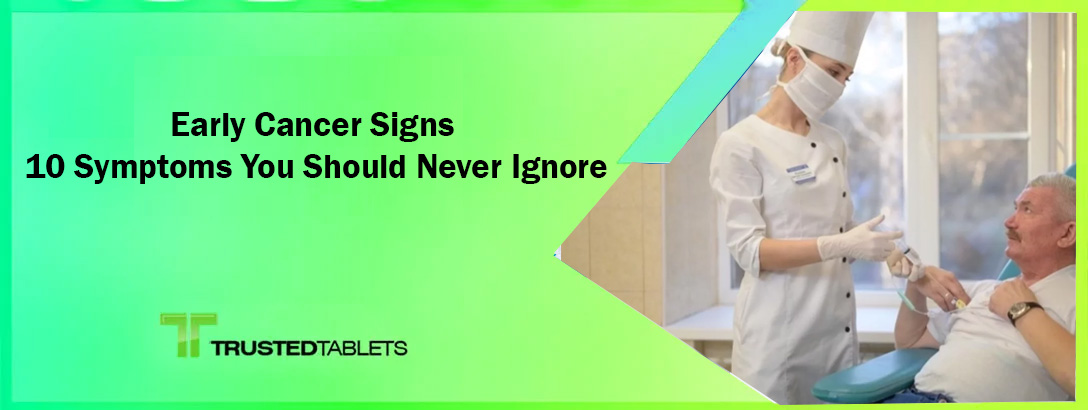Critical Introduction: Knowledge is Power, Not Panic
Cancer is most treatable when detected early. While most symptoms have benign causes, certain signs demand immediate medical evaluation. This guide, developed using protocols from the National Cancer Institute (NCI), American Cancer Society (ACS), and World Health Organization (WHO), helps you distinguish between normal bodily changes and potential red flags.
⚠️ Medical Disclaimer: This information is for education only. It does NOT replace diagnosis by a healthcare professional. Many symptoms listed are caused by conditions other than cancer.
The 10 Early Cancer Warning Signs: What Oncologists Want You to Know
1. Unexplained Weight Loss (10+ lbs in 6 Months)
Why it matters: Involuntary weight loss occurs in 40% of cancer patients (NCI data). Cancers of pancreas, stomach, esophagus, or lungs often alter metabolism.
When to act:
- 🔴 IMMEDIATE: Loss of 10+ lbs (5kg) without dieting or exercise changes.
- 🟡 MONITOR: Gradual loss with fatigue or night sweats.
Source: National Cancer Institute Surveillance, Epidemiology, and End Results (SEER) Program
2. Persistent Fatigue (Not Relieved by Rest)
Why it matters: Cancer-related fatigue involves profound exhaustion affecting daily function. Linked to blood cancers (leukemia, lymphoma) and tumors causing anemia.
When to act:
- 🔴 IMMEDIATE: Fatigue severe enough to miss work/social activities for >2 weeks.
- 🟡 MONITOR: Tiredness lasting >1 month with unexplained bruising.
Source: American Cancer Society (ACS) Guidelines
3. Lumps or Thickening (Especially in Breast, Testicles, Neck, Armpits)
Why it matters: Painless lumps are common early signs. Breast cancer lumps often feel irregular/hard; testicular lumps may cause heaviness.
When to act:
- 🔴 IMMEDIATE: Any new lump lasting >2 weeks.
- 🟡 MONITOR: Lumps changing size/shape with skin dimpling.
Action: Perform monthly self-exams. Know your normal!
Source: WHO Cancer Early Detection Guidelines
4. Changes in Bowel/Bladder Habits
Why it matters: Persistent changes signal colorectal, bladder, or prostate cancers.
Red flags:
- Bowel: Blood in stool, persistent diarrhea/constipation, pencil-thin stools.
- Bladder: Blood in urine, pain during urination, increased frequency.
When to act: - 🔴 IMMEDIATE: Blood in stool/urine (even once).
- 🟡 MONITOR: Changes lasting >3 weeks.
Source: American Society of Clinical Oncology (ASCO)
5. Non-Healing Sores or Skin Changes
Why it matters: Melanoma and other skin cancers may appear as:
- Moles changing size/shape/color (use ABCDE rule)
- Scaly patches, ulcers, or sores that won’t heal
When to act: - 🔴 IMMEDIATE: Sores lasting >3 weeks or bleeding moles.
- 🟡 MONITOR: New growths with irregular borders.
Action: Annual skin checks by dermatologist.
Source: Skin Cancer Foundation
6. Persistent Pain (No Clear Cause)
Why it matters: Pain indicates possible tumor growth pressing on nerves/organs.
Examples:
- Headaches (brain cancer)
- Bone pain (bone metastases)
- Back pain (pancreatic/ovarian cancer)
When to act: - 🔴 IMMEDIATE: Pain severe enough to wake you at night.
- 🟡 MONITOR: Pain lasting >4 weeks unresponsive to OTC meds.
Source: Memorial Sloan Kettering Cancer Center
7. Difficulty Swallowing or Persistent Hoarseness
Why it matters: Esophageal, throat, or lung cancers may cause:
- Food “sticking” in throat
- Chronic cough or voice changes
When to act: - 🔴 IMMEDIATE: Choking on food/liquids.
- 🟡 MONITOR: Hoarseness >3 weeks.
Source: National Comprehensive Cancer Network (NCCN)
8. Unusual Bleeding or Discharge
Why it matters: Bleeding from body openings is a major red flag:
- Coughing up blood (lung cancer)
- Vaginal bleeding (between periods, after menopause)
- Nipple discharge (especially bloody)
When to act: - 🔴 IMMEDIATE: ANY unexpected bleeding.
Source: American College of Obstetricians and Gynecologists (ACOG)
9. Persistent Indigestion or Trouble Eating
Why it matters: Stomach, esophageal, or ovarian cancers may cause:
- Feeling full quickly
- Nausea lasting weeks
- Abdominal pain/discomfort
When to act: - 🔴 IMMEDIATE: Vomiting blood or black stools.
- 🟡 MONITOR: Symptoms >3 weeks.
Source: Mayo Clinic Cancer Symptoms Guide
10. Nagging Cough or Shortness of Breath
Why it matters: Lung cancer symptoms often mimic respiratory infections:
- Cough lasting >8 weeks
- Wheezing or chest pain
- Coughing up blood (even streaks)
When to act: - 🔴 IMMEDIATE: Coughing up blood.
- 🟡 MONITOR: Smoker’s cough changing character.
Source: Lung Cancer Research Foundation
When to “Run to the Doctor”: The Traffic Light System
| Symptom Severity | Action Required | Examples |
|---|---|---|
| 🔴 RED LIGHT | Within 48 hours | Unexplained bleeding, 10+ lb weight loss, lumps, blood in stool/urine |
| 🟡 YELLOW LIGHT | Within 2 weeks | Fatigue >1 month, hoarseness >3 weeks, persistent pain |
| 🟢 GREEN LIGHT | Monitor at home | Temporary symptoms resolving in <1 week |
What to Expect at the Doctor’s Office
- Symptom Diary: Track duration, severity, and triggers.
- Physical Exam: Palpation of lymph nodes, organs.
- Screening Tests: Blood work, imaging (X-ray, ultrasound), endoscopy.
- Referrals: To oncologists if cancer is suspected.
Key Questions to Ask:
“Could this symptom indicate cancer?”
“What tests rule out serious causes?”
“When should I follow up if symptoms persist?”
The Power of Early Detection: Survival Statistics
| Cancer Type | 5-Year Survival (Early Stage) | 5-Year Survival (Late Stage) |
|---|---|---|
| Breast Cancer | 99% | 30% |
| Colorectal | 91% | 15% |
| Melanoma | 99% | 30% |
| Lung Cancer | 60% | 7% |
| Source: National Cancer Institute SEER Data |
Conclusion: Vigilance Saves Lives
Most early cancer signs are caused by benign conditions—but only medical evaluation can confirm. Don’t let fear delay action. If you experience any 🔴 RED LIGHT symptom, seek care immediately. For 🟡 YELLOW LIGHT symptoms, schedule within 2 weeks.
Your Health Checklist:
✅ Know your family cancer history
✅ Get age-appropriate screenings (mammograms, colonoscopies)
✅ Report changes promptly—no symptom is “too small”


